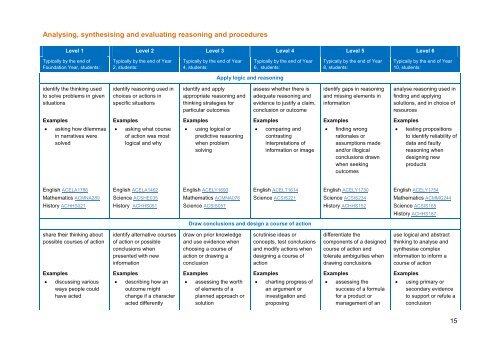Critical-and-creative-thinking
Critical-and-creative-thinking
Critical-and-creative-thinking
Create successful ePaper yourself
Turn your PDF publications into a flip-book with our unique Google optimized e-Paper software.
Analysing, synthesising <strong>and</strong> evaluating reasoning <strong>and</strong> procedures<br />
Level 1 Level 2 Level 3 Level 4 Level 5 Level 6<br />
Typically by the end of<br />
Foundation Year, students:<br />
Typically by the end of Year<br />
2, students:<br />
Typically by the end of Year<br />
4, students:<br />
Typically by the end of Year<br />
6, students:<br />
Typically by the end of Year<br />
8, students:<br />
Typically by the end of Year<br />
10, students:<br />
Apply logic <strong>and</strong> reasoning<br />
identify the <strong>thinking</strong> used<br />
to solve problems in given<br />
situations<br />
identify reasoning used in<br />
choices or actions in<br />
specific situations<br />
identify <strong>and</strong> apply<br />
appropriate reasoning <strong>and</strong><br />
<strong>thinking</strong> strategies for<br />
particular outcomes<br />
assess whether there is<br />
adequate reasoning <strong>and</strong><br />
evidence to justify a claim,<br />
conclusion or outcome<br />
identify gaps in reasoning<br />
<strong>and</strong> missing elements in<br />
information<br />
analyse reasoning used in<br />
finding <strong>and</strong> applying<br />
solutions, <strong>and</strong> in choice of<br />
resources<br />
Examples<br />
Examples<br />
Examples<br />
Examples<br />
Examples<br />
Examples<br />
• asking how dilemmas<br />
in narratives were<br />
solved<br />
• asking what course<br />
of action was most<br />
logical <strong>and</strong> why<br />
• using logical or<br />
predictive reasoning<br />
when problem<br />
solving<br />
• comparing <strong>and</strong><br />
contrasting<br />
interpretations of<br />
information or image<br />
• finding wrong<br />
rationales or<br />
assumptions made<br />
<strong>and</strong>/or illogical<br />
conclusions drawn<br />
when seeking<br />
outcomes<br />
• testing propositions<br />
to identify reliability of<br />
data <strong>and</strong> faulty<br />
reasoning when<br />
designing new<br />
products<br />
English ACELA1786<br />
English ACELA1462<br />
English ACELY1690<br />
English ACELT1614<br />
English ACELY1730<br />
English ACELY1754<br />
Mathematics ACMNA289<br />
Science ACSHE035<br />
Mathematics ACMNA076<br />
Science ACSIS221<br />
Science ACSIS234<br />
Mathematics ACMMG244<br />
History ACHHS021<br />
History ACHHS051<br />
Science ACSIS057<br />
History ACHHS152<br />
Science ACSIS165<br />
History ACHHS187<br />
Draw conclusions <strong>and</strong> design a course of action<br />
share their <strong>thinking</strong> about<br />
possible courses of action<br />
identify alternative courses<br />
of action or possible<br />
conclusions when<br />
presented with new<br />
information<br />
draw on prior knowledge<br />
<strong>and</strong> use evidence when<br />
choosing a course of<br />
action or drawing a<br />
conclusion<br />
scrutinise ideas or<br />
concepts, test conclusions<br />
<strong>and</strong> modify actions when<br />
designing a course of<br />
action<br />
differentiate the<br />
components of a designed<br />
course of action <strong>and</strong><br />
tolerate ambiguities when<br />
drawing conclusions<br />
use logical <strong>and</strong> abstract<br />
<strong>thinking</strong> to analyse <strong>and</strong><br />
synthesise complex<br />
information to inform a<br />
course of action<br />
Examples<br />
Examples<br />
Examples<br />
Examples<br />
Examples<br />
Examples<br />
• discussing various<br />
ways people could<br />
have acted<br />
• describing how an<br />
outcome might<br />
change if a character<br />
acted differently<br />
• assessing the worth<br />
of elements of a<br />
planned approach or<br />
solution<br />
• charting progress of<br />
an argument or<br />
investigation <strong>and</strong><br />
proposing<br />
• assessing the<br />
success of a formula<br />
for a product or<br />
management of an<br />
• using primary or<br />
secondary evidence<br />
to support or refute a<br />
conclusion<br />
15


